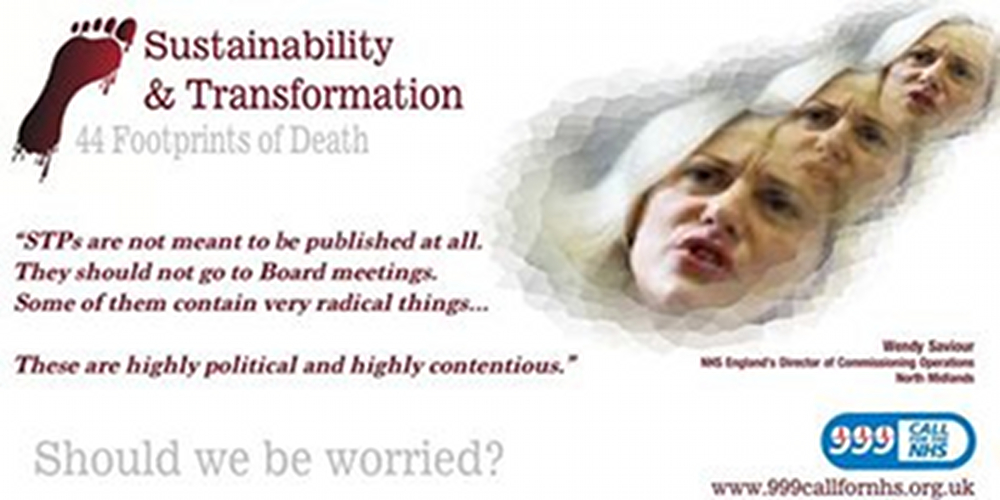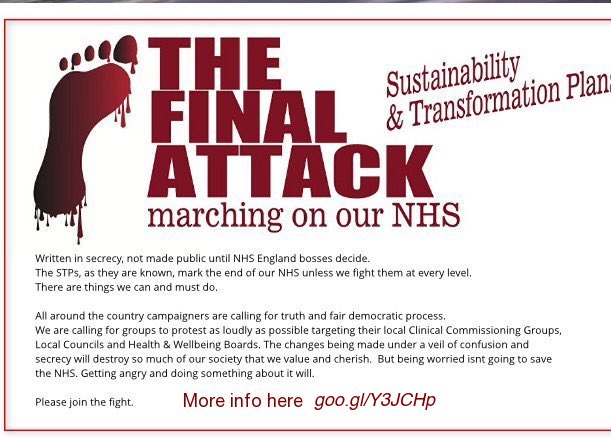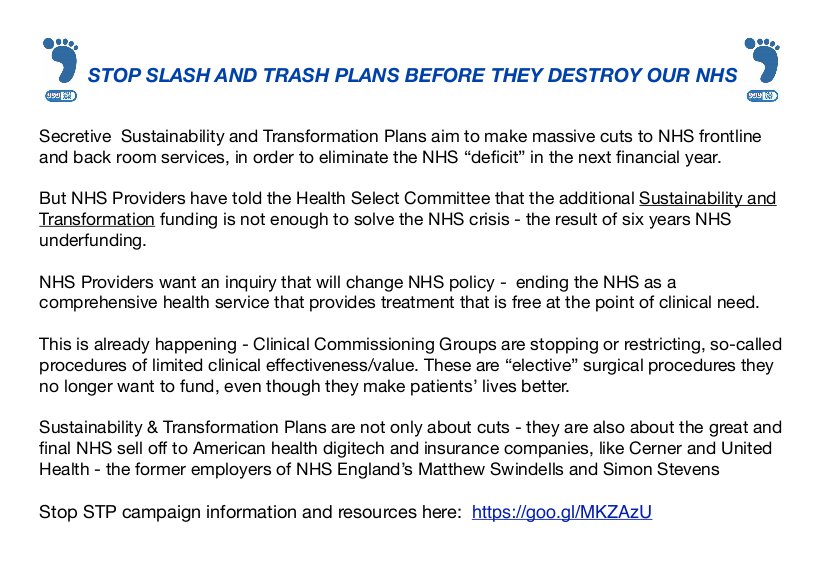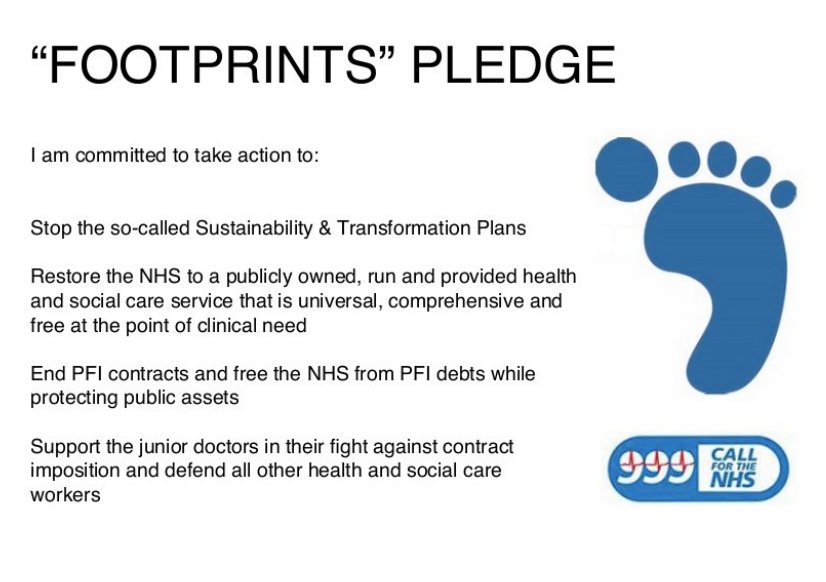There were 15 minutes for public questions at the 25th August Calderdale Health and Wellbeing Board meeting, which discussed recommendations about the Calderdale Sustainability and Transformation Plan (STP), from a private meeting on 11th August between the Health and Wellbeing Board and Calderdale Clinical Commissioning Group.
That meant only a handful of questions could be asked. The rest were meant to be answered in writing. A month on, no written answers have appeared.
NHS England has split England into 44 “Footprints”. West Yorkshire and Harrogate are Footprint 5. Each Footprint has to produce a so-called Sustainability and Transformation Plan – more like a Slash, Trash and Privatisation plan – that will rapidly make huge cuts to NHS services, in order to avoid a £30bn funding shortfall by 2020, and further open up the NHS to private health companies. Within each Footprint there are a number of “locality” STPs.
This is all being done in conditions of secrecy.
Public questions about Sustainability and Transformation Plans that were asked at the meeting
1. Sandra Shearn (Calderdale 38 Degrees NHS Campaign Group): When are the public going to be consulted about STPs?
A: Cllr Tim Swift: NHS England guidance on STP consultation is emerging. It’s not clear how far STPs will propose new changes and how far they will capture things that are proposed for discussion elsewhere. It’s not being evasive to say this, it’s just that those answers aren’t completely clear
Matt Walsh (Calderdale CCG Chief Officer): There is clear understanding about the legal framework in relation to consultation, nothing has changed, any proposals that come forward via STP will have to go to consultation.
2. Jenny Shepherd (Upper Calder Valley Plain Speaker): Did Calderdale Health & Wellbeing Board approve the the West Yorkshire “checkpoint” Sustainability and Transformation Plan which was sent to NHS England on 30th June?
Cllr Tim Swift: The Health & Wellbeing Board did not formally approve the West Yorkshire STP checkpoint submission. We are trying to clarify the role of the Health & Wellbeing Board in the STP. What’s not clear is how far STPs are something new and how far they are about existing schemes.
3. Jenny: Picking up on the reply to Sandra’s question – doesn’t engagement and consultation have to happen at a formative stage?
Matt Walsh (Calderdale CCG Chief Officer): Yes – engagement & consultation need to take place at a stage in the process where the voice of people who use those services can be heard and planners can reflect on that feedback as they make plans.
The context of the STP is the Five Year Forward View. The view of the centre [ie NHS England] is, this has been subject to the democratic process through the general election.
Where specific services are required to change to improve sustainability of services, all legislation about consultation comes into play. What we are trying to do in Calderdale is to be open and transparent that there is a process going on.
Cllr Tim Swift: We are trying to get some discussion going about the process. My personal observation is, the STP is simply a process. Formally nothing in it has a legal standing. Anything proposed in there has to be taken to existing government or local government structures. The reality is, there is a lot of top down drive for Sustainability and Transformation Plans – NHS England see it as needed for the Five Year Forward View. There will be a lot of pressure for service changes from the STP.
4. Jenny Shepherd: Since commissioning will operate with a single arrangement between local authorities and NHS clinical commissioning groups (CCGs), and CCGs will morph into accountable care systems, working with local GP groups, social care, voluntary groups, and larger community providers whether private companies or publicly owned and run NHS – will local authorities be part of the accountable care organisations or systems? And what are the legal issues around changing the current NHS & social care commissioning and delivery system into what is effectively a new form of public private partnership?
Matt Walsh (Calderdale CCG Chief Officer): I do not recognise what you said around the requirement around privatisation. I do not recognise that. In relation to the movement for closer arrangement between health & social care, what is mandated in the planning guidance 2016-17 is that systems need to gear themselves up by 2020 for this – both for how services are delivered and how they are commissioned.
In relation to the West Yorkshire STP core narrative- I don’t recognise there is agreement about a destination in ACOs [Accountable Care Organisations]. There is much to discuss about how we deliver better integration arrangements in that conversation at moment, but no plan. There are ideas to test out, particularly about how ACOs work well in the world.
5. Colin Hutchinson (Calderdale 38 Degrees NHS Campaign Group): With reference to what Matt Walsh said, Jeremy Hunt has made it clear that he favours Kaiser Permanente & Valencia models of Accountable Care Organisations. Are those the two main models you’ll be working towards, whether you call it an ACO or whatever?
Matt Walsh (Calderdale CCG Chief Officer): There are many models globally which we could learn from. My personal view is south central alaska and a Netherlands model [ I didn’t catch the name.]
Paul Butcher (Calderdale Director of Public Health): The Health and Wellbeing Board will be discussing integration of care and NHS in October.
Cllr Tim Swift: The move towards integrating NHS & social care has been happening in Calderdale for some time. Regarding the issue about Accountable Care systems, it’s interesting the the language has shifted from Accountable Care Organisations to Accountable Care systems & I’m not totally sure anyone’s got a clear blueprint. We’re working it out in terms of what’s best for Calderdale, not taking top down measures.
Dr Alan Brook (Chair, Calderdale CCG Governing Body): The priority is for form to follow function. The whole of the Health & Wellbeing Board has been about integrating NHS and social care in an iterative process with no preconception about what those forms will be.
Written questions from Jenny Shepherd – still unanswered
1. How do Councillors square their duty to represent and fully inform the public, with NHS England’s statement that: “STPs are not meant to be published at all. They should not go to Board meetings. Some of them contain very radical things. These are highly political and highly contentious.”?
2. Why did Councillors think it was ok to hold a private meeting with Calderdale CCG to discuss the development of Calderdale and West Yorkshire STPs?
3. Where are the Minutes of that meeting?
4. Where are the minutes of previous Calderdale Health and Welllbeing Board STP workshops in May and June?
5. What is the proposed Transformation Forum, who are its members, what is its reason for existence, who is it accountable to?
6. Who will be on the Integrated Commissioning Board, what is its statutory authority – if any – and who is it accountable to?
7. On page 6 of the STP & SIngle Plan for Calderdale Development, for the 11 Aug HWB development session, have the WY STP “big decisions” already been taken?
8) How is the HWB going to make sure that governance and decision making processes on service and finances at scale across West Yorkshire will “maintain democratic legitimacy”?
Particularly since there is no statutory basis for the West Yorkshire Footprint STP, which is being drawn up by organisations operating without any formal governance process. As of the June meeting of Calderdale CCG Governing Body, no formal agreements on the West Yorkshire STP governance had been agreed, except for the Memorandum of Understanding.
The West Yorkshire STP Update (Appendix 2) says that all health partner organisations have needed to establish relationships and governance to augment their current statutory authority. So what legal processes have been undertaken to augment organisations’ statutory authority? And if no legal processes have been carried out, how are these augmentations of organisations statutory authority lawful? What is the Council’s legal officers’ opinion of the legality of the STPs and their governance & decision making, processes?
To add further evidence to support my question, a report by the Centre for Health & the Public Interest (CHPI) says,
“the whole [STP] process has a markedly extra-legal character.”
Through the the imposition of Sustainability and Transformation Plans, the government has effectively undone laws created by the Health and Social Care Act 2012, without bothering to go through Parliament. The CHPI says:
“…the resulting decision-making is governed by no statutory rules: it is not clear who will be accountable for the results in terms of service provision, or the accompanying redeployments of public funds, or the conflicts of interest or the opportunities for fraud which the process is liable to generate…Who is participating in each ‘local health system’, who they represent, how they are reporting back, where a record can be found of the meetings held and the decisions reached – this information at least should surely be systematised and made public if the process is to be considered in any way democratic. Independent published evaluations are also needed of what the various new models of care have acheived in practice, in terms both of patient care and productivity gains.”
To recap and repeat the question: how can this STP process have any democratic legitimacy and how can the HWB make sure that it does?
9. What is the total amount of money in the Sustainability and Transformation Fund for the West Yorkshire & Harrogate STP footprint, how and where is it being allocated, with what conditions?
10. How is the “significant and material impact of WY acute trusts working together” going to affect the Right Care Right Time Right Place hospital services clinical model?
11. On p 7 of the STP & SIngle Plan for Calderdale Development, for the 11 Aug HWB development session:
- what is the Plan for Calderdale? –
- P 11 says 3 elements have already been developed – where are they?
- what is the Healthy Place initiative?
12. Page 12 of the STP & SIngle Plan for Calderdale Development, for the 11 Aug HWB development session says there is clarity on health gap & plans to close it, finance gap and plans to close it and quality gap and plans to solve it. Where is this clear info?
13. The Calderdale Single Plan is due to be finished on 16 Sept. It includes “Big Decisions we are making” about community services & primary care (Care Closer to Home/ Multispeciality Community Provider Vanguard/Accountable Care Organisations) and hospital services (acute configuration, partnerships) – but these items have been put out to public consultation and the Clinical Commissioning Groups are not due to make decisions about how to proceed with them until their meeting in public on 20 October. So what “big decisions” will go into the 16 Sept Calderdale STP?
14. Calderdale STP says another “Big decision” is dialogue with our communities – so how are you going to do this if you won’t even publish the draft plan?
15. What is the Advisory Board offering international intelligence to Calderdale?
16. The Future slide shows community services and CHFT acute reconfiguration, but these have been out to public consultation and the CCGs have not decided on what to do in response to the public consultation – or so they would like us to believe. Isn’t this clear evidence that the CCGs have predetermined the outcome of the consultation?
17. When & where is the one-off meeting of Health and Wellbeing Board Chairs and Council Leaders being held, to discuss any collective view on the West Yorkshire Footprint STP before final submission? Will it be held in public? Will the Minutes be publicly available?
18. The West Yorkshire STP update says health partner organisations have developed new ways of working with regulatory bodies. Why has this been necessary and what are the new ways of working with regulatory bodies?
19. Please supply a complete list of the WYSTP Leadership Team members and Clinical Forum Members.
20. The West Yorkshire STP update says, “engagement around the emerging West Yorkshire STP will start with our local communities and workforce as priorities and plans are agreed collectively by our Boards.” – But isn’t engagement supposed to happen at a formative stage?
21. What contribution to closing financial and care quality gaps are collaborative programes and local plans going to make?
22. Who from Calderdale went to the 2 August 2016 Leadership Day meeting of the Clinical Forum and Leadership Team?
23. When will Calderdale Health & Wellbeing Board see the West Yorkshire STP finance template before it is sent to NHS England on 31 August?
24. Who from Calderdale will go to 6 September Leadership Day meeting of the Clinical Forum and Leadership Team? When will they have sight of the key content of the West Yorkshire STP & draft communications and engagement strategy, in order to be able to decide whether to approve them? When will the Calderdale Health & Wellbeing Board as a whole, and the public, see these documents?
25. What does it mean for Calderdale & Huddersfield NHS Foundation Trust (CHFT), when the West Yorkshire STP core narrative says:
“Local hospitals will work together in a group to better meet the needs of local people. This includes sharing clinical staff and resources, and making hospital care local and accessible, with a centre in every major urban area.”?
Is CHFT going to have to share clinical staff and resources with other Trusts? If so, which? And what is a local hospital? Is it something different from a District General Hospital? If so, how?
26. Isn’t it ridiculous to claim that “Citizens will be actively engaged in the planning, design, delivery and governance of care” when the STPs are being planned in secret, under NHS England’s orders?
27. What is the point in the West Yorks STP organisation working with Local Economic Partnerships?
28. Why isn’t there a website and contact details for the West Yorkshire STP Programme Board?
29. Have MPs been consulted about these West Yorkshire and Calderdale STPs?
30. Please do NOT accept the recommendations of the 11 August HWB private meeting. Instead, please immediately publish:
- the West Yorkshire “checkpoint” Sustainability and Transformation Plan which was sent to NHS England on 30th June – why has it not been published already? NW London has published theirs.
- the current draft of the Calderdale STP and the current draft of the final West Yorkshire STP – the final version is due to go to NHS England in October
- the financial information from NHSI that will inform the October West Yorkshire STP
AND immediately submit the Calderdale STP documents to scrutiny by the Adults Health & Social Care Scrutiny Panel and the West Yorkshire & Harrogate STP to the the West Yorks joint scrutiny committee
31. How is CHFT going to meet the “control total” condition of its Sustainability & Transformation Plan funding – that it must more than halve its planned £40.5m deficit this financial year, to £16.53m? What is it going to have to cut, to make this possible?
32. What is the substance of the discussions about this and other S&T Plan conditions that have been going on between NHS Improvement, NHS England and CHFT?
33. How is CHFT going to meet the condition of Sustainability & Transformation funding, that it must have a recovery plan in place that shows when they will break even, within a reasonable time frame?Because the Right Care Right Time Right Place pre-consultation business case shows CHFT in deficit for at least the next decade; and no one during the public consultation drop ins was able to say at what point beyond 2026 CHFT might break even.
34. How will Calderdale Clinical Commissioning Group (CCCG) meet its commitment to uphold NHS Constitutional standards, when Matt Walsh told the August CCCG Governing Body meeting that in the light of NHS England’s STP “financial reset” document, the CCG should start “having conversations now to secure the financial position this year”, through restricting treatments? Examples he gave were:
- only allowing one outpatient follow-up after an elective operation
- stopping prescriptions for self-limiting illnesses and for vitamins, food supplements and gluten-free products
- cherry picking patients for medical and surgical interventions that are “procedures of limited clinical value” – although “cherry picking” is not his term – which was more like: “selecting patients most likely to benefit”
35. What is on Calderdale CCG’s list of Procedures of Limited Clinical Value? We need to know – particularly since the Royal College of Surgeons has said that:
‘Procedures of Limited Clinical Value’ (PLCV) is a term NHS managers have applied to a range of elective surgical procedures that they no longer wish to fund…[B]ecause of the current financial restrictions,…many proven operations known to enhance health and improve quality of life have been included in this category, and hence are being denied to patients who need them.”
36. What do Calderdale Local Medical Committe think about the introduction, via the Sustainability & Transformation Plan, of the Multispeciality Community Provider “emerging care models and contracts” for GPs and community care, that open the door to privatisation of community and primary care – as is already happening elsewhere, with companies like Virgin Care gobbling up community health & social care contracts and private companies taking over GP contracts? Has Calderdale LMC been consulted? Local Medical Committees in many parts of the country, including Yorkshire, have complained about their exclusion from any consultation over the STPs in their areas.
You can read about the 25th August Health and Wellbeing Board meeting here.
DO SOMETHING!
Please sign the pledge, share it, join local Stop STP actions.




